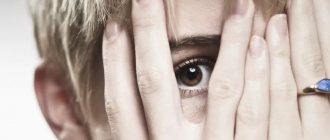Nocturnal panic attacks, sometimes called “nighttime panic attacks,” can occur either during sleep or while trying to fall asleep. They are characterized by a sudden onset of fear, and usually lead to a variety of unpleasant physical symptoms. These may include:
- Cold sweat
- Cardiopalmus
- Hyperventilation and shortness of breath
- Fluctuations in body temperature (fever or chills)
- Chest pain
- A depressing feeling of doom
Panic attacks usually don't last more than 10 minutes, but the effects (which can be emotional, physical, and cognitive) can last a long time.
Why do panic attacks happen at night?
At night, we are left alone with our fears. It is easier to escape from worries and unpleasant thoughts during the day than at night. If a person is prone to anxiety and has a number of accumulated problems, or is experiencing stress, then the likelihood of nighttime panic attacks increases.
In this state, our brain is in “defense mode,” constantly monitoring for threats, including any changes it senses in the body. So if you go to bed feeling tense, when your body begins to relax, it may perceive it as something dangerous and trigger a stress response. Panic attacks are your body's way of protecting you.
Nightmares
Panic attacks that occur during sleep are usually caused by nightmares. Nightmares are considered a form of sleep disorder that affects the nervous system, causing unusual behavior.
Nightmare
Nightmares are episodes of intense fear during sleep, usually occurring in the first third of the night. You may wake up terrified with a frantic intensity of physical symptoms that trigger a panic attack.
What to do when attacks occur before bed?
As mentioned above, at night we often begin to process all the stresses of the day or worry about the day ahead. Panic attacks before bedtime usually occur during stressful moments in life, when our head is filled with problems. Maybe these are quarrels in relationships, conflicts at work, a period of painful changes.
After we've had a panic attack, worrying about it happening again can create a vicious cycle in which we become afraid to fall asleep. Although this type of reaction is considered normal, it often causes even more concern.
What to do if you have a panic attack at night
If you are having a panic attack, experts advise taking the following steps:
- Close your eyes and inhale slowly and deeply through your nose.
- Then exhale slowly and deeply through your mouth.
- If you can, continue this process as long as it lasts, counting 1 - 5 on each inhalation and exhalation.
Try to accept that you are experiencing a panic attack without any resistance. When we try to fight anxiety, we only make it worse. It can be scary, but try to move towards the anxiety rather than away from it.
Panic attack
Once you feel better, the worst is over. Just remember – your body is on high alert right now, so it will likely take some time to calm down again. So sleep is out of the question for a while.
4.Do the exercise
Have you heard anything about the vagus nerve? This is a paired nerve that runs from the brain to the abdomen and can help reduce anxiety if you train it.
To do this, you need to sit or lie down comfortably and turn your head to the right “all the way.” That is, until the moment you can and feel comfortable. The gaze should also be directed to the right and directed as far as possible. Stay in this position until you feel like yawning, taking a deep breath or sighing, then do the same on your left side.
Tips on what to do after an attack
- Go to the bathroom and splash some cold water on your face. The cold causes a shock in the system, which prompts the body to go into survival mode, ultimately lowering the heart rate.
- Then try to find a simple activity that will calm you down. Wash the dishes, sweep the floor, clean out the refrigerator. Whatever you choose, do it in such a boring and mundane way that it requires minimal mental effort. Remember, you are not trying to distract yourself here, you are just doing normal, run-of-the-mill activities while your symptoms begin to subside.
- If you wake up sweaty, take a warm shower, put new sheets on your bed, and put on your comfiest pajamas. Having removed the physical evidence of a panic attack, we will start over and return to sleep as quickly as possible.
- Gradually you will begin to feel your body begin to relax. Return to bed only when you are ready. If it's not time yet, try meditating or taking a few deep breaths until your body begins to calm down again.
Remember the main thing, no matter how terrible panic attacks are, they cannot cause us physical harm.
Anxiety before bed: what you can do about it
Sleep and insomniaAnxietyExercise
Who doesn’t know this feeling: you’re lying in bed, but it’s impossible to sleep because there are a lot of problems spinning in your head? Do this and this and this and this. Don't forget something. Take this into account. What if something like this happens
Anxieties flow one upon another, and instead of pleasant drowsiness, a stupid feeling of heightened nervous excitement arises. What a dream this is.
Subsequently, it is possible that meta-anxiety, or anxiety about anxiety, may arise: “Yesterday I couldn’t sleep well, what if I have trouble falling asleep again today? This is definitely something wrong."
Methodology “Constructive Anxiety”
Carney & Waters (2006) developed a specific technique to combat anxiety before bed. 1 They called it “constructive anxiety” —in other words, it is a structured and solution-oriented procedure that helps deal with overwhelming worries.
The authors conducted a study: for 5 nights, one group of subjects followed the “constructive anxiety” procedure. The second group did not use the procedure, but instead subjects wrote down their anxious thoughts and completed questionnaires.
The result, as expected, showed that “constructive anxiety” reduced the degree of nervous anxiety arousal before sleep.










